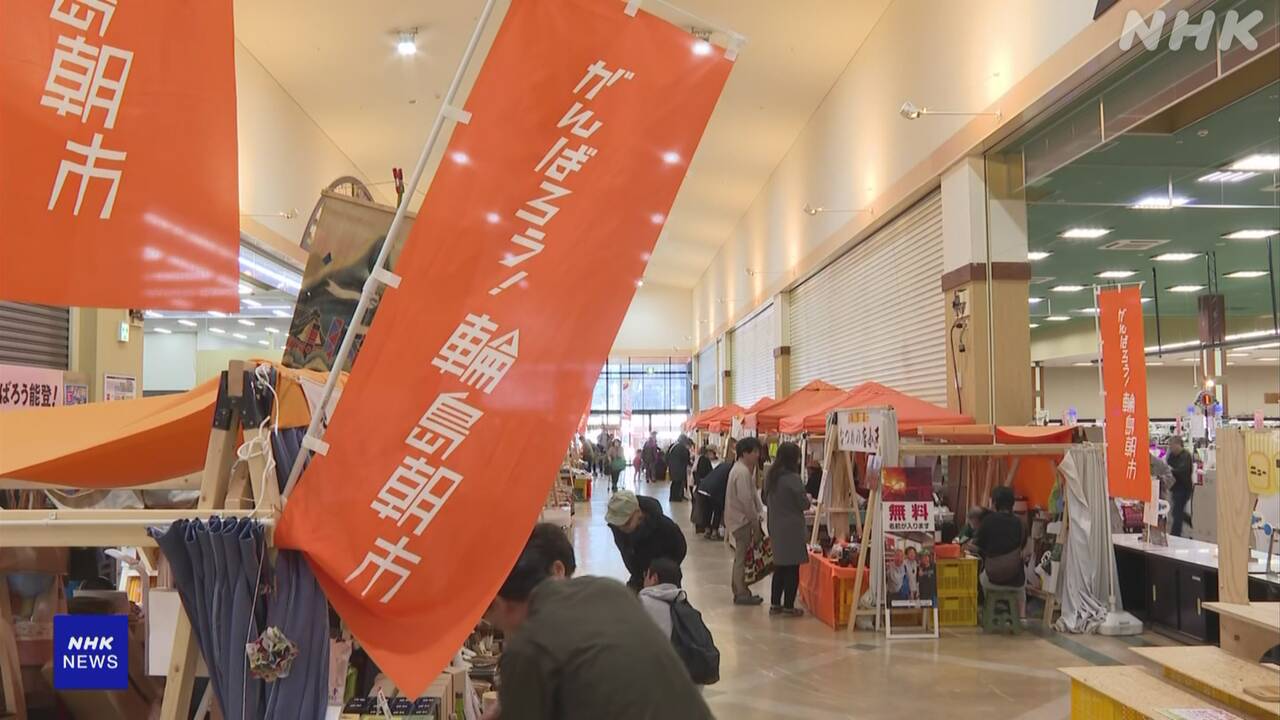Published: 2025-04-29 15:12
輪島 朝市通りの出店者らが各地で開催「出張朝市」地元で開催

能登半島地震で被災した石川県輪島市の「朝市通り」の出店者たちが各地で開いている「出張朝市」が、輪島市内で開かれ、観光客などでにぎわいました。
「昭和の日」の29日、「出張朝市」は、「朝市通り」から1キロほど離れた商業施設の中で開かれ、およそ30の露店が、朝市名物のオレンジ色のテントを出して、魚の干物や輪島塗のおわんなどを販売しました。
会場には、大型連休を利用して帰省した人や観光客などが次々と訪れ、露店を営む女性たちと会話をしながら土産物を購入するなどして、朝市の雰囲気を味わっていました。
輪島市朝市組合によりますと、4月に入り、岐阜県や長野県から、バスツアーなどで訪れる回数が増えているということです。
長野県から来た38歳の女性は「被災状況が気になって、観光で訪れました。地元の人が元気に商売をしているのを見て、応援のためにお土産を買いました」と話していました。
輪島市朝市組合の冨水長毅組合長は「ことしの大型連休は、ぜひ多くの人に来てもらい、輪島を応援してほしい」と話していました。
| # | 言葉 | 意味 |
|---|---|---|
| 6 | 朝市 | あさいち (朝市) : morning market |
| 4 | 輪島市 | わじまし (輪島市) : Wajima (city) (place) |
| 3 | 開く | ひらく (開く) : 1. to open; to undo; to unseal; to unpack 2. to bloom; to unfold; to spread out |
| 3 | 訪れる | おとずれる (訪れる) : 1. to visit; to call on 2. to arrive (season, time, situation, etc.); to come; to appear |
| 3 | 組合 | くみあい (組合) : association; union; guild |
| 2 | 通り | とおり (通り) : 1. avenue; street; way; road 2. coming and going; street traffic |
| 2 | 出張 | しゅっちょう (出張) : business trip; official trip |
| 2 | 観光客 | かんこうきゃく (観光客) : tourist |
| 2 | 露店 | ろてん (露店) : street stall; stand; booth |
| 2 | 輪島 | わしま (輪島) : Washima (surname) |
| 2 | 大型連休 | おおがたれんきゅう (大型連休) : long holiday (esp. Golden Week in late April and early May) |
| 2 | 長野県 | ながのけん (長野県) : Nagano prefecture (Chūbu area) |
| 2 | 応援 | おうえん (応援) : 1. aid; assistance; help; support; reinforcement 2. cheering; rooting (for); support |
| 2 | 話す | はなす (話す) : 1. to talk; to speak; to converse; to chat 2. to tell; to explain; to narrate; to mention; to describe; to discuss |
| 1 | 能登半島 | のとはんとう (能登半島) : Noto Peninsula (Ishikawa Prefecture) |
| 1 | 地震 | じしん (地震) : earthquake |
| 1 | 被災 | ひさい (被災) : being a victim of (some disaster); suffering from |
| 1 | 石川県 | いしかわけん (石川県) : Ishikawa prefecture (Hokuriku area) |
| 1 | 出店 | でみせ (出店) : 1. food stand; food stall 2. branch store |
| 1 | 各地 | かくち (各地) : every place; various places |
| 1 | 内 | うち (内) : 1. inside; within 2. while (e.g. one is young); during; within (e.g. a day); in the course of |
| 1 | にぎわう | にぎわう (賑わう) : 1. to be crowded with people; to be bustling with 2. to prosper; to flourish; to do thriving business |
| 1 | 昭和の日 | しょうわのひ (昭和の日) : Shōwa Day (national holiday; April 29); Showa Day |
| 1 | 離れる | はなれる (離れる) : 1. to be separated; to be apart; to be distant 2. to leave; to go away |
| 1 | およそ | およそ (凡そ) : 1. about; roughly; approximately 2. generally; on the whole; as a rule |
| 1 | 名物 | めいぶつ (名物) : famous product; special product; speciality; specialty |
| 1 | オレンジ色 | オレンジいろ (オレンジ色) : orange (colour, color) |
| 1 | 干物 | ほしもの (干し物) : things dried in the sun (esp. clothes, dyed cloth, etc.) |
| 1 | わん | わん (椀) : 1. bowl (wooden) 2. counter for bowls of food or drink |
| 1 | 販売 | はんばい (販売) : sales; selling; marketing |
| 1 | 帰省 | きせい (帰省) : homecoming; returning home |
| 1 | 次々 | つぎつぎ (次々) : in succession; one by one |
| 1 | 営む | いとなむ (営む) : 1. to run (a business); to operate; to conduct; to practice (law, medicine, etc.) 2. to carry out; to perform; to lead (a life) |
| 1 | 土産物 | みやげもの (土産物) : souvenir |
| 1 | 購入 | こうにゅう (購入) : purchase; buy |
| 1 | 雰囲気 | ふんいき (雰囲気) : 1. atmosphere; mood; ambience; ambiance; aura; feel 2. a certain air; presence; special aura; something (about someone) |
| 1 | 味わう | あじわう (味わう) : 1. to taste; to savor; to savour; to relish 2. to appreciate; to enjoy; to relish; to digest |
| 1 | 入る | いる (入る) : to get in; to go in; to come in; to flow into; to set; to set in |
| 1 | 岐阜県 | ぎふけん (岐阜県) : Gifu prefecture (Chūbu area) |
| 1 | 回数 | かいすう (回数) : number of times; frequency; count |
| 1 | 増える | ふえる (増える) : to increase; to multiply |
| 1 | 観光 | かんこう (観光) : sightseeing; tourism |
| 1 | 地元 | じもと (地元) : 1. home area; home town 2. local |
| 1 | 商売 | しょうばい (商売) : trade; business; commerce; transaction; occupation |
| 1 | 買う | かう (買う) : 1. to buy; to purchase 2. to value; to have a high opinion |
| 1 | 冨水 | とみみず (冨水) : Tomimizu (surname) |
| 1 | 多く | おおく (多く) : 1. many; much; plenty; a lot 2. majority (of); greater part (of) |